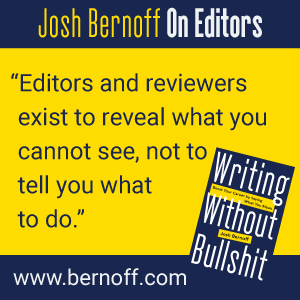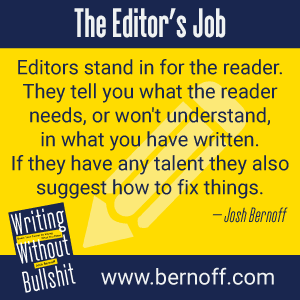Why the best writers get the most out of developmental editors

For anyone who hasn’t used a developmental editor, it may be hard to understand what a developmental editor does.
Put simply, a developmental editor reads a manuscript and makes suggestions intended to help that manuscript accomplish the author’s ultimate goal of communicating meaning.
For example:
- Is the idea weak or muddy? The developmental editor works with you to make it better.
- Are the chapters organized rationally? The editor suggests how to reorder them, so they better explain the idea.
- Are your chapters structured in a way that’s easy to follow and draws the reader in? The editor may suggest a better chapter organization.
- Are pieces out of place or repetitive? The editor suggests how to reorganize them to make the text clearer.
- Are you being consistent? If not, the editor will point out where and how your terminology may be confusing people.
- Are your paragraphs and sentences organized well? The editor may suggest a better or clearer organization.
- Is your tone appropriate? The editor will suggest where you don’t sound professional (or sound too boring).
- Do you have textual problems like repeated words, passive voice, jargon, overlong sentences, overlong paragraphs, lack of parallelism, or other grammatical or language problems? Since these interfere with how your text communicates meaning, your developmental editor will suggest how to correct them. (Leaving all those flaws to the copy editor makes it far more likely some errors will slip through.)
Standing in for the reader
Because of the kind of work developmental editors do, authors think their job is basically to rewrite things the way they should be written.
But that’s a little off.
The developmental editor is always thinking like a reader. “If I were in the target audience but ignorant of this concept,” the developmental editor thinks, “would this make sense to me?”
The developmental editor must at the same time maintain an attitude of ignorance (like a reader), as well as an encyclopedic knowledge of all the tricks and methods that a writer can use to fix a textual problem. Ignorance and skill is a hard combination to pull off. That’s what makes good developmental editors rare.
If you have a disagreement with the editor’s suggestion, don’t ask “Are they right and am I wrong?” Ask “Will this make it easier for readers to get the most out of my book?” If the problem is real, but the suggestion isn’t appropriate, come up with another solution.

Your job as a writer is not to do what the editor says, as you would if, say, you were doing an arithmetic problem and teacher said you’d done it wrong. Your job is to understand the problems the editor points out and use your skill to address them.
This is why, ironically, the best writers get the most benefit out of a developmental editor. The editor gives them the information they need to gain perspective on the manuscript and the opportunity to make it even better.